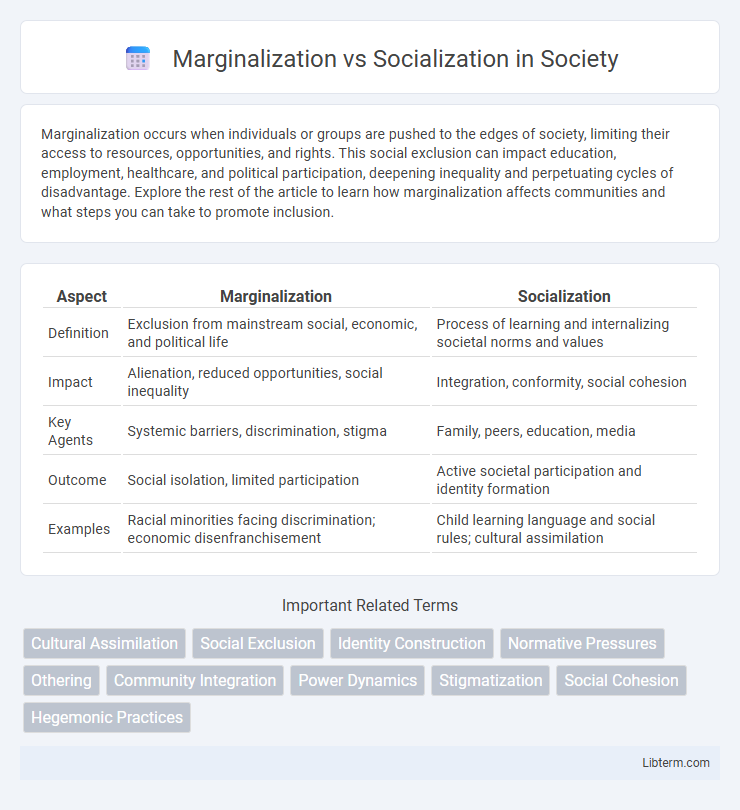Marginalization occurs when individuals or groups are pushed to the edges of society, limiting their access to resources, opportunities, and rights. This social exclusion can impact education, employment, healthcare, and political participation, deepening inequality and perpetuating cycles of disadvantage. Explore the rest of the article to learn how marginalization affects communities and what steps you can take to promote inclusion.
Table of Comparison
| Aspect | Marginalization | Socialization |
|---|---|---|
| Definition | Exclusion from mainstream social, economic, and political life | Process of learning and internalizing societal norms and values |
| Impact | Alienation, reduced opportunities, social inequality | Integration, conformity, social cohesion |
| Key Agents | Systemic barriers, discrimination, stigma | Family, peers, education, media |
| Outcome | Social isolation, limited participation | Active societal participation and identity formation |
| Examples | Racial minorities facing discrimination; economic disenfranchisement | Child learning language and social rules; cultural assimilation |
Understanding Marginalization: Definition and Scope
Understanding marginalization involves recognizing the systematic exclusion of individuals or groups from social, economic, and political opportunities based on characteristics such as race, ethnicity, gender, or socioeconomic status. This exclusion limits access to resources, participation in decision-making, and social integration, leading to disparities in health, education, and employment. Marginalization often results in diminished voice and agency, contrasting with socialization processes that promote inclusion and cultural assimilation within mainstream society.
The Concept of Socialization: An Overview
Socialization is the lifelong process through which individuals learn and internalize the norms, values, behaviors, and social skills necessary to function effectively within their society. It involves interactions with family, peers, educational institutions, and media, shaping identity and social roles from childhood to adulthood. This process contrasts with marginalization, where individuals or groups are excluded from mainstream social participation and access to resources, hindering their social integration and development.
Key Differences Between Marginalization and Socialization
Marginalization excludes individuals or groups from full participation in social, economic, or political life, often resulting in reduced access to resources and opportunities. Socialization involves the process by which individuals learn and internalize the norms, values, and behaviors necessary to function effectively within their society. Key differences lie in inclusion versus exclusion, where socialization promotes integration and belonging, while marginalization leads to isolation and disenfranchisement.
Historical Contexts: Marginalization and Socialization in Society
Historical contexts reveal that marginalization often emerged through systemic exclusion based on race, class, or gender, limiting access to resources and social participation. Socialization processes, by contrast, have historically reinforced societal norms and values, enabling individuals to integrate into dominant cultural frameworks. Examining these dynamics highlights how power structures shaped opportunities for inclusion or exclusion within communities over time.
Psychological Impacts of Marginalization
Marginalization often leads to feelings of isolation, low self-esteem, and increased risk of mental health disorders such as depression and anxiety, as individuals are excluded from social, economic, and political participation. Socialization fosters a sense of belonging and identity, enhancing psychological well-being by promoting supportive relationships and social integration. The psychological impacts of marginalization manifest in chronic stress and diminished coping abilities, reducing overall life satisfaction and increasing vulnerability to psychological distress.
The Role of Socialization in Identity Formation
Socialization plays a crucial role in identity formation by allowing individuals to internalize societal norms, values, and roles, which shape their self-concept and social identity. Through interactions with family, peers, and institutions, individuals develop a sense of belonging and social competence essential for personal and social functioning. Marginalization disrupts this process by excluding individuals from mainstream socialization channels, leading to weakened identity development and social alienation.
Factors Contributing to Marginalization
Factors contributing to marginalization include systemic inequality, discrimination based on race, gender, ethnicity, or socioeconomic status, and lack of access to education, healthcare, and employment opportunities. Social exclusion and power imbalances further deepen marginalization, limiting individuals' participation in social, political, and economic activities. Institutional biases and cultural stigmas perpetuate these barriers, reinforcing cycles of disadvantage and social isolation.
The Influence of Socialization on Social Inclusion
Socialization plays a crucial role in fostering social inclusion by enabling individuals to acquire the norms, values, and behaviors necessary for meaningful participation in society. Through processes such as family upbringing, education, and peer interactions, socialization helps reduce marginalization by promoting a sense of belonging and acceptance within various social groups. Effective socialization mechanisms contribute to bridging social gaps and enhancing community cohesion by facilitating mutual understanding and respect among diverse populations.
Strategies to Combat Marginalization and Promote Socialization
Effective strategies to combat marginalization include community empowerment programs that enhance access to education, healthcare, and employment opportunities for disadvantaged groups. Promoting socialization involves creating inclusive spaces and activities that encourage interaction across diverse social, economic, and cultural backgrounds, fostering mutual respect and understanding. Policies focused on anti-discrimination laws and social support networks also play a critical role in reducing social exclusion and enhancing societal integration.
Building Inclusive Communities: Bridging the Gap
Marginalization excludes individuals or groups from full participation in societal systems, while socialization promotes their integration and acceptance within communities. Building inclusive communities requires bridging this gap through intentional practices that empower marginalized voices and foster equitable opportunities. Emphasizing empathy, cultural competence, and shared goals cultivates environments where diversity thrives and social cohesion strengthens.
Marginalization Infographic

 libterm.com
libterm.com